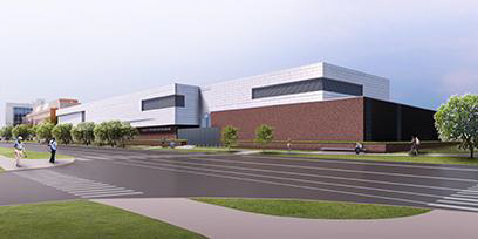Emerging Particle Accelerator Economy: CCED Receives EDA Grant Award to Study the Greater Lansing Region's emerging Mid-Michigan Particle Acceleration Industry Cluster (MMPAC)
By: Josh Pichardo, MSU, Research Assistant, pichard2@msu.edu Jennifer Bruen, MSU REI, Project Manager, bruenjen@msu.edu John Melcher, MSU CCED, Associate Director, melcher@msu.edu

In December of 2008, the U.S. Department of Energy selected Michigan State University (MSU) to be the site for the Facility for Rare Isotope Beams (FRIB). This resulted in the approval of a $730 million on campus construction project which is expected to be completed between the years 2020 and 2022. MSU is home to the No. 1 Nuclear Physics Graduate Program in the country and the construction of the facility will continue MSU's leadership in nuclear physics research and education. The FRIB will provide intense beams of rare isotopes. Rare in this case refers to short-lived nuclei not normally found on earth. Scientists will discover the properties of these rare isotopes and their potential application in society, ranging from medicine, national security, material science, environmental protection and energy. It is critical for the Lansing region to capitalize on the economic and workforce development opportunities afforded by this substantial public investment in an emerging science field. Research conducted at the facility has the potential to have a significant impact on the economy, employment, manufacturing, marketing, and quality of life in the Greater Lansing region.
This global particle physics and superconducting sector is evolving quickly. To grow the industry in the region there will need to be broad based support to trigger effective economic strategies that extend the impact of FRIB from the laboratory into the broader community. FRIB will draw nuclear scientists from around the world and may spur the creation of new companies and employment opportunities. The capacity of the region to successfully host and expand the industry will depend in part on community and regional readiness to seize upon this opportunity and develop new methods of production, products, markets and workforce related to accelerator research and development. In October 2017 the US Dept. of Commerce Economic Development Administration (EDA) awarded Michigan State University Center for Community and Economic Development (CCED) a grant to research and design a strategic plan that will make the particle acceleration industry a cornerstone of future economic development efforts in the region. In collaboration, the Lansing Economic Area Partnership (LEAP) and the Tri-County Regional Planning Commission (TCRPC) and CCED will be conducting an in-depth analysis and developing specific guidance for local private sector leaders, economic development professionals, community planners, educators, policy makers and other key stakeholders in the region on actions likely to increase the region's job creation and economic benefits from the unique FRIB investment. The study will focus on the following areas:
- Knowledge Supply Chain:
Developing a strategy to create a "pipeline" or bridge to training or education that could result in more employment within the industry. Identifying skills and talents needed in the industry and the training capacities of the region to fill positions in the industry. Providing information to inform students and the higher education community about jobs in the industry. - National Innovative Practices:
Developing a list of successful communities/regions who are implementing short, medium and long term actions that are yielding maximum job creation; who have been successful in collaborating with local accelerator labs and/or facilities; and who have incorporated similar knowledge into an overall regional economic development strategy. - Accelerator Component Supply Chain Analysis:
With guidance from an Advisory Board, CCED will create a list of accelerator related companies ideally suited for the region. This expansive list of companies will assist LEAP in their accelerator company retention efforts, resulting in more companies remaining in the region. It will also assist LEAP in business attraction efforts, which should result in more companies relocating to the region. The CCED will also map the region's particle accelerator industry and opportunities in the supply chain. - Regional Assessment:
MSU CCED will identify assets that may create the ideal environment and competitive advantage to grow and develop the accelerator industry in the region. Historically, the region has been tied to the automotive industry, manufacturing, and production. In terms of talent, skills and experience these core competencies remain significant, thus the region is perfectly suited for the particle acceleration industry. However, a wide range of skills education and training ranging from an associate degree to a Ph.D. will be critical to the "talent supply chain" of this industry and in the development of a successful cluster in the region. This study will provide the region with an exciting opportunity to further advance a new high tech global industry cluster. To learn more about the FRIB, visit https://frib.msu.edu.
For more information about the CCED, LEAP and TCRPC collaborative project please visit the CCED website or contact John Melcher at 517-353-9555, melcher@msu.edu.

